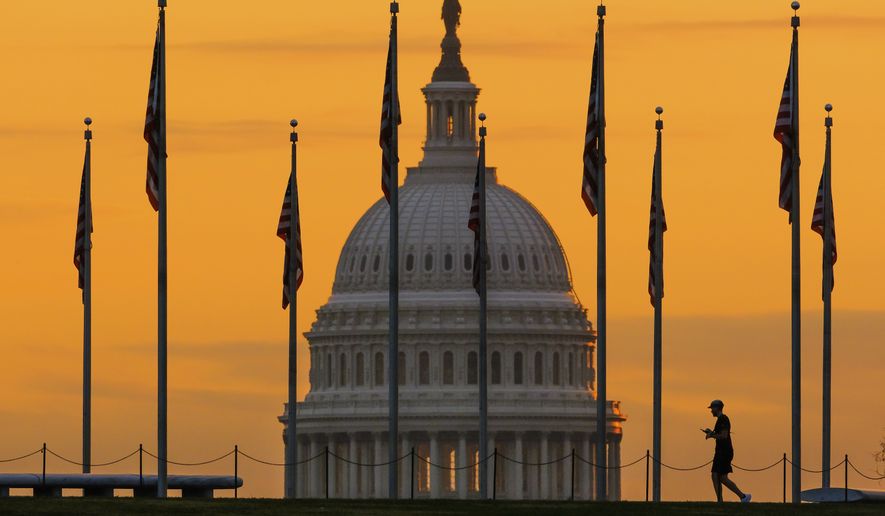President Biden is asking Congress to hand over another $10 billion in funding to combat COVID-19 and other infectious diseases, and an additional $37.7 billion in aid to Ukraine as Congress begins debate on its next spending measure ahead of a mid-December deadline.
White House officials say the funding, which the administration expects to last through the remainder of the fiscal year, is critical to protect the American people from a potential winter coronavirus surge and to help Ukraine persist in the face of Russia’s unrelenting brutality.
But the nearly $48 billion ask presages one final spending showdown with Democrats still at the helm in both chambers as Congress again caps a legislative session with government-funding brinkmanship.
Congress opted not to include White House-requested COVID-19 funding in its last stopgap spending bill to keep the government afloat earlier this fall, as Democrats were unwilling to risk a shutdown with Republicans despite heavy White House lobbying.
In September, the White House requested $22.4 billion to fund COVID-19 testing, vaccines and treatments, and to maintain defenses against the virus warning that failing to fund the request would prevent the government from replenishing its national stockpile of at-home tests and leave domestic testing capacity in a lurch ahead of a protracted fall surge.
Republicans, though, said the White House should claw back unspent relief funds previously doled out in COVID-19 spending packages totaling trillions of dollars.
Senior administration officials told reporters Tuesday that they are confident Republicans will come around this time as the U.S. stares down another potential coronavirus surge this winter.
“We are going to be very clear with Congress as we have been about what happens if they don’t give us this funding,” one official said. “We’ve been very careful to focus this request on the needs that we have immediately and the COVID response that have earned bipartisan support in the past.”
“We’re absolutely confident that we can make our case with Congress and they will step up and do their part,” the official added.
The request includes more than $2 billion to ensure continued access to vaccines and therapeutics, $5 billion to support the development of next-generation vaccines, and $1 billion to prevent, detect and respond to COVID-19 through vaccines, tests and treatments. Another $750 million would be used for long-COVID research and treatment.
The White House is also asking or $400 million to restore smallpox vaccines used to respond to the monkeypox outbreak and another $350 million to begin the procurement and distribution of treatment for hepatitis C and to prevent HIV.
President Biden is also asking Congress for more funding for Ukraine as the Russian invasion shows no sign of letting up ahead of what could be a brutal winter war.
SEE ALSO: Manchin quickly becomes Republicans’ next target with first 2024 challenge
The request includes $21.7 billion in additional military aid to Kyiv and to replenish U.S. stockpiles of weapons that have been sent to Ukraine.
The White House is also requesting $14.5 billion for direct budget support and humanitarian assistance, $626 million for nuclear security support for Ukraine and to reduce energy costs, and $900 million for healthcare assistance for Ukrainian refugees.
Congress included $12.3 billion in aid to Ukraine in its stopgap spending bill this fall, in line with President Biden’s request in September.
The package marked the third round of U.S. aid to Ukraine approved by Congress, adding to more than $54 billion in aid approved earlier this year.
But Tuesday’s request comes amid fractures in both parties over support for the war effort.
Last month, 30 House progressives urged President Biden in an open letter to push more assertively for peace talks, a clear break within the president.
The lawmakers also suggested Mr. Biden would have strong Democratic support for aid to Ukraine if he followed their advice, urging the president to “pair the military and economic support the United States has provided to Ukraine with a proactive diplomatic push.”
The letter marked the first indication that unanimous support within the Democratic Party for Mr. Biden’s Ukraine policy could be at risk unless future funds come with diplomatic demands as well.
Rep. Pramila Jayapal, Washington Democrat and Congressional Progressive Caucus chairwoman, later withdrew the letter under intense pressure from party leaders.
On the other side of the aisle, House Minority Leader Kevin McCarthy warned in October that Congress will not provide a “blank check” for Ukraine if the GOP were to win the majority in the midterm elections, which looks likely to have happened.
“I think people are gonna be sitting in a recession and they’re not going to write a blank check to Ukraine,” the California Republican told Punchbowl News. “They just won’t do it … It’s not a free blank check.”
Some Republicans are openly expressing skepticism about providing endless financial support for Kyiv while Americans face rising economic uncertainty at home.
A majority of GOP lawmakers, however, still support funding Ukraine, despite 57 Republicans in the House and 11 in the Senate voting against a $40 billion aid package in May.
In addition to the request for additional COVID-19 funding and Ukraine aid, White House officials said they are putting together a request for additional funding for natural-disaster relief following this year’s devastating hurricanes in Florida and Puerto Rico.
Officials expect to finalize that request soon.
For more information, visit The Washington Times COVID-19 resource page.
• Joseph Clark can be reached at jclark@washingtontimes.com.




Please read our comment policy before commenting.